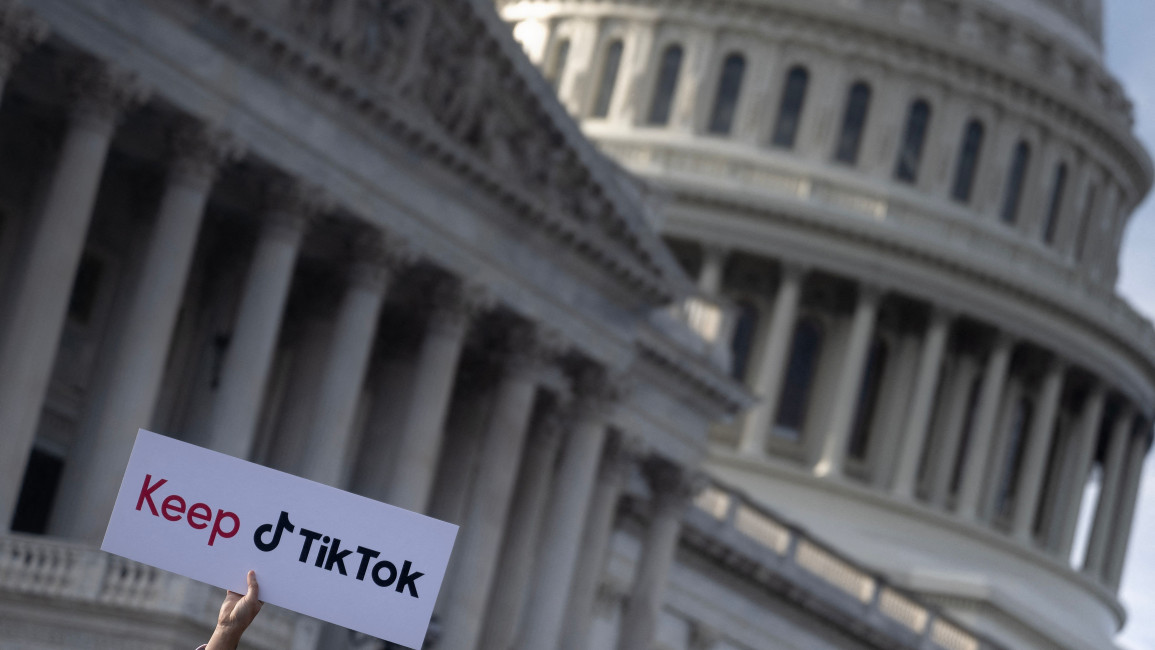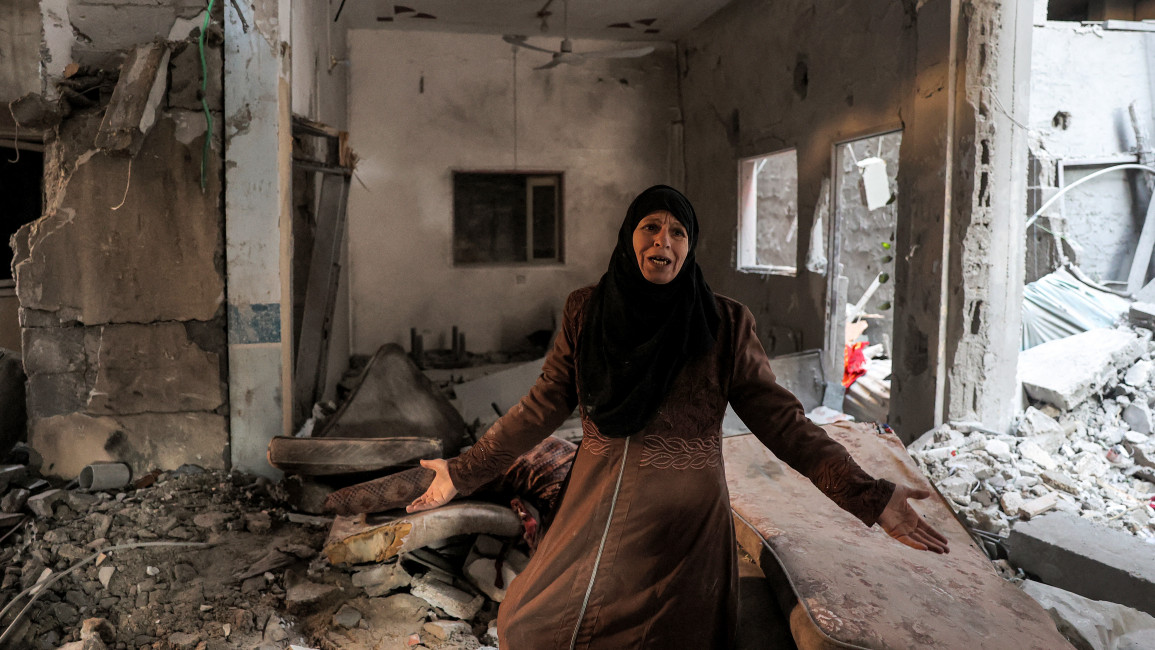Banning TikTok won't fix privacy issues but will set a dangerous precedent for free speech as more Americans are exposed to realities in Gaza, writes Eric Sype.
Eric Sype
04 Apr, 2024

Regardless of the true motives behind efforts to ban TikTok, it would have a harmful impact for freedom of expression and digital rights. [Getty]
The recent United States Congressional action to ban TikTok is a perfect display of US double standards.
Banning one of the most widely used social media platforms in the world is a major attack on freedom of expression, and forcing a sale to ownership that is more politically acceptable to the US is extremely problematic.
Civil society and digital rights experts have roundly denounced this effort. Furthermore, heads of the US intelligence agencies have explicitly stated that privacy concerns around TikTok are purely hypothetical, leading one to question what the real factors pushing this forward might be.
But regardless of the true motives behind this action, if successful, it will set a dangerous precedent worldwide that will harm freedom of expression.
To understand what is at stake, we must examine this action through the lens of social media’s impact on global perceptions about what is happening in Palestine. Conservative politicians like Nikki Haley would like you to believe that spending time on TikTok directly correlates to becoming more anti-Semitic.
"With the failures of the mainstream media, Palestinians have seen social media as an opportunity to be heard and seen by the world after decades of suffering in forced isolation"
Unpacking this wildly ridiculous and debunked claim points to some important facts. First, the US general public is becoming increasingly more supportive of Palestinians. Second, the mainstream Western media’s coverage of Israel and Palestine has displayed a bias, and Palestinians have taken to social media as a means of trying to show the international community a more honest depiction of realities on the ground in Gaza.
Regardless of whether you believe that social media directly impacts public opinion about Palestine and Israel, it should be undeniable that Palestinians have the right to share their stories with the international community.
With the failures of the mainstream media, Palestinians have seen social media as an opportunity to be heard and seen by the world after decades of suffering in forced isolation. If people change their mind about Palestinians after seeing their stories on social media, it is because they were finally able to see Palestinians as human beings, rather than the stereotypes and statistics that they often are referred to as in the Western media.
That is something all people, and especially oppressed communities, should have access to.
However, social media is certainly not a perfect solution. Palestinians have experienced widespread silencing and censorship across all major platforms.
As TikTok has explained, there is a lot of pro Palestine content on its platform because their user base is broadly sympathetic to the Palestinian cause, but Palestinian advocates have also complained about TikTok’s censorship. Furthermore, there are legitimate privacy concerns with TikTok, as there are with all major social media platforms.
Problems that exist on TikTok are not unique but rather endemic across social media. In the age of surveillance capitalism, all major social media platforms profit off of user data. As the saying goes, “if you aren’t paying for it, you are the product”.
And with the complete lack of data privacy legislation in the US, even if Congress was successful in pushing ByteDance to sell TikTok, it would still be extremely feasible for the Chinese government, or anyone for that matter, to buy US users’ data from a data broker.
RELATEDPerspectivesRichard Silverstein
Banning the platform will not solve privacy issues at all, and neither will forcing the sale to presumably US ownership. Just look at how US owned social media platforms treat their users.
US owned social media platforms actually have a horrible track record when it comes to human rights. In the wake of the Rohingya Genocide in 2017, Amnesty International found that the companies “reckless pursuit of profit substantially contributed to the atrocities perpetrated by the Myanmar military against the Rohingya people in 2017”.
Of course, the social media giant apologised and claimed to change its ways. However, reporting from November showed that Facebook has been profiting from paid-for-placement ad campaigns advocating for the ethnic cleansing of Palestinians.
Moreover, since Elon Musk took over Twitter, and renamed it X, the platform has become a hotbed for hate speech and incitement to violence against Palestinians. Since the beginning of the war on Gaza alone, there have been over 3.5 million documented instances of hateful and inciting posts targeting Palestinians.
"Concerns about foreign actors propagandising social media are neither new or unique to TikTok, and yes, even the United States engages in such activities"
Other concerns have been raised about China’s ability to use TikTok as a propaganda machine to achieve its foreign policy aims. In the context of Israel's information war against Palestine, this is an absolutely ludicrous issue to bring up.
Throughout October of 2023, investigative reporting has shown that Israel invested millions of dollars into a paid-for-placement ad campaign on YouTube, targeting citizens from Western countries, to justify collective punishment against all Palestinians, and to garner support for its campaign of indiscriminate bombing in Gaza.
Moreover, recent reporting also showed that former President Donald Trump implemented a CIA program to use Chinese social media to turn the Chinese population against its government.
These examples again illustrate that concerns about foreign actors propagandising social media are neither new or unique to TikTok, and yes, even the United States engages in such activities.
Banning TikTok would set a dangerous precedent for the world. Authoritarian state actors have long tried to silence their opposition, and many would take this sort of action as evidence that it is okay to ban major media platforms without expecting international condemnation. That would threaten freedom of expression around the globe.
The Biden Administration actually condemned Nigeria for blocking access to Twitter only a few years ago.
It is curious that during an election year, when Biden’s campaign has been severely impacted by Palestinian advocates demanding he call for an immediate and permanent ceasefire, that he has now shown his support for potentially banning a platform himself.

Eric Sype is a Community Organizer and Advocate for Palestinian Human Rights. He is 7amleh’s National Organizer in the United States and works to build a broad base of support for Palestinian Digital Rights within the US.
Opinions expressed in this article remain those of the author and do not necessarily represent those of The New Arab, its editorial board or staff.






 A damaged apartment in New Taipei City. [Fabian Hamacher/Reuters]
A damaged apartment in New Taipei City. [Fabian Hamacher/Reuters] A man reacts after a brick wall in his house collapsed, in Taipei. [CNA via AFP]
A man reacts after a brick wall in his house collapsed, in Taipei. [CNA via AFP] At least 26 buildings have collapsed, more than half in Hualien. [CNA via AFP]
At least 26 buildings have collapsed, more than half in Hualien. [CNA via AFP] Damaged buildings in Xindian district of New Taipei City. [CNA via AFP]
Damaged buildings in Xindian district of New Taipei City. [CNA via AFP] Rescuers helping a man from a damaged building in New Taipei City. [CNA via AFP]
Rescuers helping a man from a damaged building in New Taipei City. [CNA via AFP] Emergency workers assisting a man trapped in a damaged building, in New Taipei City. [CNA via AFP]
Emergency workers assisting a man trapped in a damaged building, in New Taipei City. [CNA via AFP] Firefighters work at the site where a building collapsed following the earthquake, in Hualien. [Taiwan National Fire Agency/Handout via Reuters]
Firefighters work at the site where a building collapsed following the earthquake, in Hualien. [Taiwan National Fire Agency/Handout via Reuters] A sign showing a subway train suspension following the earthquake, in a subway station in Taipei. [Daniel Ceng/EPA]
A sign showing a subway train suspension following the earthquake, in a subway station in Taipei. [Daniel Ceng/EPA]





